Keiji Haino: the interview
The experimental musician speaks about hard rock, long hair and electricity bills
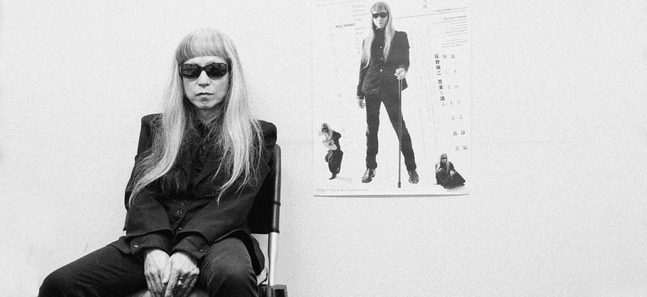
Posted: Sat Jul 07 2012
He's a legend, a true original. For 40 years, he's towered over the Japanese underground music scene, attracting praise, scorn and outright bafflement with his experiments in freeform psychedelic rock, noise, drone, solo percussion and whatever else animates his muse. His distinctive appearance – jet-black clothes, ever-present sunglasses, long hair and immaculate fringe – is matched only by his almost ascetic lifestyle: he's vegetarian, doesn't drink, smoke or take drugs, though he is rather partial to cakes.
So it's with no small amount of surprise that we found ourselves sat opposite Keiji Haino, discussing the pricing structure of electricity bills. Then again, we've caught him on unfamiliar ground. With a new film about the musician, Document Haino Keiji, opening in Tokyo this weekend, he's doing his first ever all-day interview sessions. And what's more, he actually seems to be enjoying the experience.
The Haino story is clouded with myths and exaggerations, both scandalous (that he and the members of his first band, Lost Araaf, went into hiding after inciting a riot at the Sanrizuka Genyasai music festival in 1971) and cute (that he had to cancel an appearance at the Le Weekend Festival in Scotland due to over-indulging on cream cakes). Kazuhiro Shirao's portrait removes some layers of mystery while adding others. There are revealing insights into Haino's childhood in Kawagoe – where he dreamed of becoming a zookeeper and chafed against the strictures of the education system – and his working process, though it's unlikely that anyone will ever fully fathom what goes on under that carefully sculpted haircut.
In an interview from 15 years ago, when you were asked how you saw yourself in your sixties or seventies, you said, 'I'd like to be totally white-haired and still be playing hard rock.' Seems to be going according to plan, doesn't it?
[Laughs] I'm glad that's how it's worked out. As for whether I'll be doing this when I'm 70, I can only say that I'd like to. But I've made it as far as 60: I've got that far.
They say you get mellower as you get older, but your recent shows would seem to suggest the opposite...
I just keep on finding more things that I like. With everyone else, if they like something but then they discover something new, they'll give up on the old one. But I like things so much, it surprises even myself. I still listen to everything, there are still lots of things I won't put up with, and I won't say 'You can't do that' in a small voice. For instance, when people are saying 'Get rid of nuclear energy' – it's never changed anything in the past, but I'd still rather be the one right at the front, shouting 'Get rid of it!'
What are the kinds of things you won't put up with?
Let me tell you something serious. [Laughs] Do you want to hear something interesting? Have you ever had a close look at your electricity bill? In Japan, there's a basic rate and then it increases in tiers. Maybe I'm the only one who's confused by this, but there are three tiers, and the sum of those gives you the final amount. But the way you use electricity is just like water, isn't it? I don't know why they insist on adding it up like that: you pay this much if you use less than a certain amount, then this much if you exceed that amount. I started thinking about this system, so I called Tepco, asked them lots of questions, got angry with them, and then the person I was talking to admitted it themselves: this system is strange. [Laughs] I think everyone should go home and take a good look at their electricity bills. People who don't use much fall within the basic rate, so they don't pay much. But if you fall in the second tier, you pay both the basic rate and the extra charge, and Tepco gradually gets richer. Then when someone messes up and has to be fired, they can use that money to pay them off and find someone else. That's what I won't put up with. When they raised tuition fees in Canada recently, people protested in the streets, but Japanese people just don't do that. Some say it's different now, but people have been brainwashed into not questioning authority, because of the imperial system. That makes me angry. [Laughs]
It's not just restricted to electricity bills, is it?
No, it affects everything. When you grow up, you realise that making a point about these things won't make any difference. But if something's out of line, it doesn't matter if you're an adult or a child. There's a difference between getting angry and doing something about it, but I won't put up with things I don't accept.
You said the same kind of thing during Document Haino Keiji, didn't you?
There are lots of more extreme things I could talk about, but I've stopped dwelling on the heavy things as it gets too negative. I could give you some more extreme material. I do a lot of interviews, and I decided to soften the parts that felt over the top. [Laughs] I can pretend to be an adult. But if there's something I won't put up with, I'm deadly serious about it.
I was surprised that there weren't any interviews with other people in the film. Didn't you think it would be worth including comments from other musicians?
Actually, the director decided from the start that it would only contain interviews with me. They received comments from lots of other people [which are used in the publicity for the film], didn't they? I thought that those people would appear in the film, but the director said from the start that he wanted to focus on me – so much so that he wouldn't let other people appear. So I said, 'Well, what shall we talk about?'
Do you think there's anyone who can explain your music better than you?
No. I'm showing off a little, but it's because I invented my music. There's that scene in the film where I'm playing percussion, right? I think I was inventing sound there. I'm discovering sound, and inventing music. This is probably a very Japanese way of putting it, but I'm defying the notion that you can't create something from nothing. I want to start from zero. When Europeans don't understand something, they still make an effort to understand it by inventing terms and definitions. I want to obliterate those. That would be enough in itself. I listen to a hell of a lot of music; I've listened to most kinds of European music from the 4th to the 20th century. It's because I like music so much that I want to create something completely different. My basic principle is to start from the very first sound, which is why I describe my music as being something that didn't exist before.
When you supported Akron/Family with Fushitsusha last year, I couldn't tell how much of it was composed, so I was really intrigued by the scenes of you rehearsing with the band, and the system of notation that you'd devised. How did you develop that?
The only way is to explain things carefully, and create sound in the studio. If I put my score in front of a professional musician, I don't think they'd be able to do anything with it at first: they wouldn't understand what was written there. Your fingers move naturally, when you're practising. [Mimes fingers on a fretboard.] I'll ask the other members: why does this sound have to come next? For instance, if I played C and then D, I probably wouldn't get stopped at airports. [Laughs] I think I get stopped because I play F after C. That's just an example. By demonstrating it myself, I get the members to understand why I go to F rather than D.
Do you think you could express what you wanted to using conventional notation?
No, I don't think I could. The important thing for me is the process of moving from that first sound to the next one. When a sound does this [hits the table], you can hear it, and you understand the what it is. But if you then do this [hits the table softly] nobody notices it. If you're playing the piano, you're compelled to go in a particular direction, your mind and spirit aren't free. I'll keep asking, 'Why don't you go here?' I want to convey to the other members: this way is difficult, but it's interesting.
How do you pick your band members?
It's difficult. This is top secret, but all of my band members have long hair. [Laughs] I've always liked '60s hard rock. It's difficult for young people to understand now, but for my generation in Japan, having long hair was a real risk – although at the same time, I liked that. [Laughs] There's no other way to say it. Maybe it was a childish thing to be fighting over, but that risk was what mattered. It's like what I was saying earlier: if something seems strange to me, I won't do what everybody else is doing. [If I'm told to] go here, look at this, go straight, I'll do something different. That's why I've had long hair since I was young. If one day they suddenly issued a law banning loud noise, I'd be arrested right on stage. I want to play with the kinds of people who'd be arrested there with me. I want to play with people who won't let themselves be ordered around.
When you're collaborating with other people – for instance when you played with Tony Conrad here a few years ago – how far are you willing to compromise what you're doing?
That's a good question. With Tony, we agreed on what we would do beforehand, so if my amp was too loud, he could say, 'Haino, point your amp in another direction.' [Laughs] We like each other a lot, so anything can happen. If I get too loud, I'll bring it down suddenly so I can hear what Tony is doing. I'll have my amp up loud, but if that means you can't hear what the other people are doing, there's no point playing together, so I won't do that.
You say in the film that you wanted to be a zookeeper when you were young. Was that what inspired you to become a vegetarian?
Probably. Young people today probably don't know this, but there was rationing after the war, so there was a limit on the amount of food you received each day. I grew up just after that, but the mentality still remained. As far as I can remember, I was forced to eat meat: it wasn't because I thought it was delicious, but because there weren't any other options. At some point, I started to feel that I didn't like the thought of killing animals, and didn't want to eat meat – so while [keeping animals in a zoo] is unnatural, there's a connection between my wanting to become a zookeeper and becoming a vegetarian. I like animals, so I don't want to eat them. There wasn't a moment when I suddenly declared, 'I'm a vegetarian!'
40 years ago there weren't any vegetarian restaurants in Japan, so you really had to fight. If you went to a Chinese restaurant and asked for yakisoba or fried rice without the meat, the staff would say, 'If you take the meat out, it isn't yakisoba.' It would be bad if I was asking them to add it, but if I'm asking to take something out, surely they can take it out? It was tough. Asking nicely wasn't going to get you anywhere: you had to demand, 'TAKE IT OUT!' It was a real fight. [Laughs] 40 years ago, the only option for vegetarians was fighting. But a century ago, everyone here was vegan. That's how people lived: Japanese were vegans for a long time, so that's a better lifestyle for them. There probably aren't any other countries where the average height of young people has increased so much in the past 40 years. It's because their diet has changed; it's frightening. People aren't Japanese any more, they don't have the same way of thinking. They're just American clones.
I've never been to one of your marathon solo shows at Koenji Showboat, but I'm curious about how much of it is planned out in advance.
I'll look at what instruments I've got with me: for example, 30 minutes of oud, 20 minutes of oscillator, 15 minutes of hard guitar, 40 minutes of blues guitar, something like that. [Laughs] I'll go like that, and then realise, 'Ah, it's 5 hours!' [Laughs] Showboat gives me all the time I need – 'Just play for as long as you like' – so if I think 'I'd like to play shamisen tomorrow', that'll be an extra 20 minutes. [Laughs] The longest show I've ever played was an eight-hour Fushitsusha gig 20 years ago. I could still do that now. I love music. It'd be fun.
I saw you DJing at Liquidroom once, a long time ago. Why don't you get more bookings?
Other DJs don't like it. Maybe they're jealous? [Laughs] You should set something up. If you set it up, I'll do it! [Laughs]
Document Haino Keiji opens at Theater N Shibuya on July 7
Tweets
- About Us |
- Work for Time Out |
- Send us info |
- Advertising |
- Mobile edition |
- Terms & Conditions |
- Privacy policy |
- Contact Us
Copyright © 2014 Time Out Tokyo










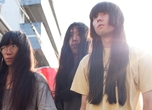
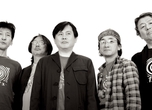
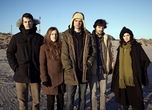
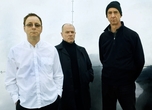
Add your comment